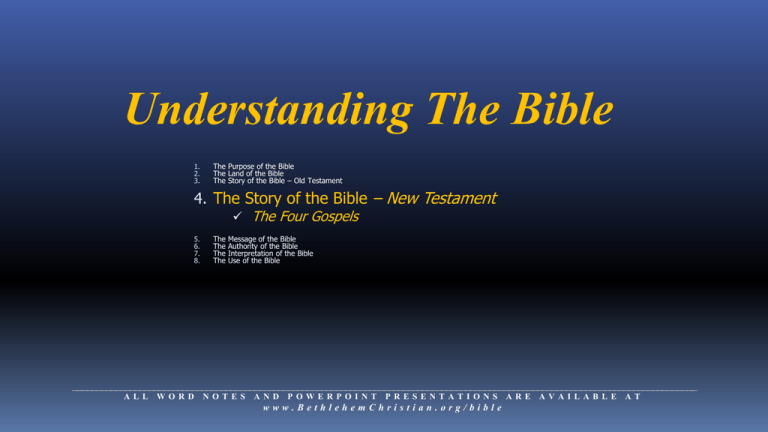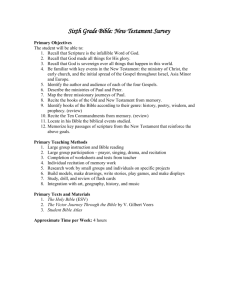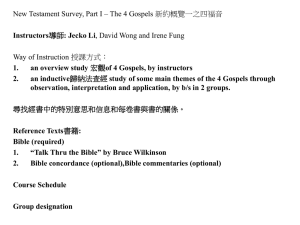PowerPoint 97 - Bethlehem Christian Church
advertisement

Understanding The Bible 1. 2. 3. The Purpose of the Bible The Land of the Bible The Story of the Bible – Old Testament 4. The Story of the Bible – New Testament The Four Gospels 5. 6. 7. 8. The The The The Message of the Bible Authority of the Bible Interpretation of the Bible Use of the Bible __________________________________________________________________________________________________________________________________ ALL WORD NOTES AND POWERPOINT PRESENTATIONS ARE www.BethlehemChristian.org/bible AVAILABLE AT The very first word Jesus uttered in his public ministry (in the Greek text of the Gospel of Mark) indicates this. It was the word fulfilled: and saying, “The time is fulfilled, and the kingdom of God is at hand; repent and believe in the gospel.“ (Mark 1:15) 16But blessed are your eyes because they see, and your ears because they hear. 17For I tell you the truth, many prophets and righteous men longed to see what you see but did not see it, and to hear what you hear but did not hear it. (Matthew 13:16-17) 15He said to them, "Go into all the world and preach the good news to all creation. 16Whoever believes and is baptized will be saved, but whoever does not believe will be condemned. (Mark 16:15-16) For what I received I passed on to you as of first importance: that Christ died for our sins according to the Scriptures. (1 Corinthians 15:3) The Synoptic Gospels is a term used by modern New Testament scholars for the Gospels according to Matthew, Mark, and Luke of the New Testament in the Bible. They are three of the four gospels, of which the Gospel of John is not included due to it's different style from the other three gospels. The term synoptic is derived from a combination of Greek words: συν (syn = together) and οψις (opsis = seeing) to indicate that the contents of these three Gospels can be viewed side-by-side. Matthew: Matthew’s main purpose is to prove to his Jewish readers that Jesus is their Messiah. He does this primarily by showing how Jesus in his life and ministry fulfilled Old Testament Scriptures. Although all the Gospel writers quote the Old Testament, Matthew includes nine proof texts* unique to his Gospel to drive home his basic theme: Jesus is the fulfillment of the Old Testament predictions of the Messiah. * (1:22-23; 2:15; 2:17-18; 2:23; 4:14-16; 8:17; 12:17-21; 13:35; 27:9-10) Mark: The first mention of him is in connection with his mother, Mary, who had a house in Jerusalem that served as a meeting place of believers: When this had dawned on him, he went to the house of Mary the mother of John, also called Mark, where many people had gathered and were praying. (Acts 12:12) Mark portrays Jesus as “the Suffering Son of God.” In particular, Mark attempts to show that, although Jesus should have been received with honor as God’s Son, he was destined to die a humiliating death to pay for humankind’s wrongdoing. One of the most important things that Mark did was to stress the events around the crucifixion of Jesus. Luke: Luke tells us in his introduction that his work is the result of careful research, that he has written an “orderly account,” and that his purpose was to enable the reader “to know the certainty of the things that have been taught.” 1Many have undertaken to draw up an account of the things that have been fulfilled among us, 2just as they were handed down to us by those who from the first were eyewitnesses and servants of the word. 3Therefore, since I myself have carefully investigated everything from the beginning, it seemed good also to me to write an orderly account for you, most excellent Theophilus, 4so that you may know the certainty of the things you have been taught. (Luke 1:1-4) Luke (cont.): Luke was probably a Gentile by birth, well educated in Greek culture, a physician by profession, a companion of Paul at various times from his second missionary journey to his final imprisonment in Rome, and a loyal friend who remained with the apostle after others had deserted him: Only Luke is with me. Get Mark and bring him with you, because he is helpful to me in my ministry. (2 Timothy 4:11) Luke’s Gospel presents the works and teachings of Jesus that are especially important for understanding the way of salvation. Its scope is complete from the birth of Christ to his ascension, its arrangement is orderly, and it appeals to both Jews and Gentiles. The writing is characterized by literary excellence, historical detail and warm, sensitive understanding of Jesus and those around him. John: John was a business man of some means. He was one of five partners in a fishing business that employed “hire servants.” 19When he had gone a little farther, he saw James son of Zebedee and his brother John in a boat, preparing their nets. 20Without delay he called them, and they left their father Zebedee in the boat with the hired men and followed him. (John 1:19-20) John (cont.): While the other three gospels are called the Synoptic Gospels, John’s is sometimes called the Spiritual Gospel because it does more than report the events in Jesus’ life—it explains what those events reveal about him. John carefully chooses only incidents that help answer the question, “Who is Jesus?” The reason lies in the purpose stated near the conclusion of John: “But these are written that you may believe that Jesus is the Christ, the Son of God, and that by believing you may have life in his name.” (John 20:31) John (cont.): John acknowledges he has left out much Jesus did. Jesus did many other things as well. If every one of them were written down, I suppose that even the whole world would not have room for the books that would be written. (John 21:25) Understanding The Bible 1. 2. 3. The Purpose of the Bible The Land of the Bible The Story of the Bible – Old Testament 4. The Story of the Bible – New Testament The Four Gospels 5. 6. 7. 8. The The The The Message of the Bible Authority of the Bible Interpretation of the Bible Use of the Bible __________________________________________________________________________________________________________________________________ ALL WORD NOTES AND POWERPOINT PRESENTATIONS ARE www.BethlehemChristian.org/bible AVAILABLE AT





